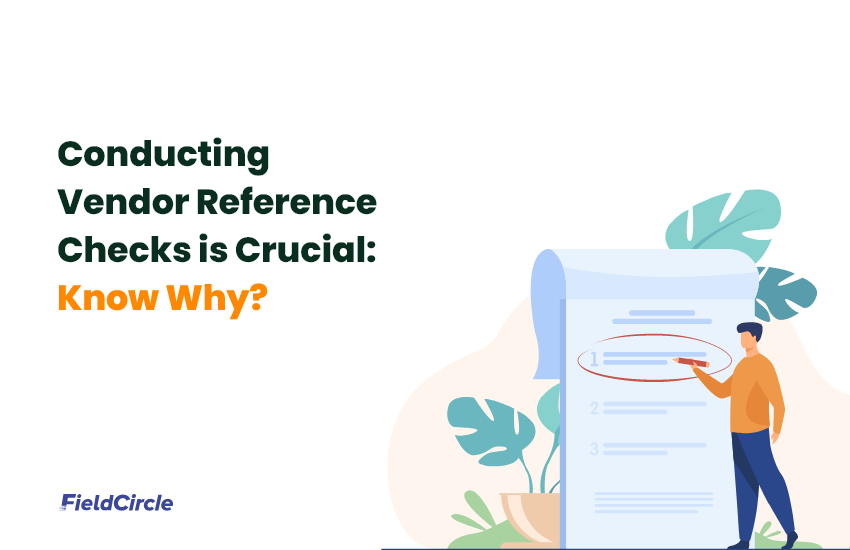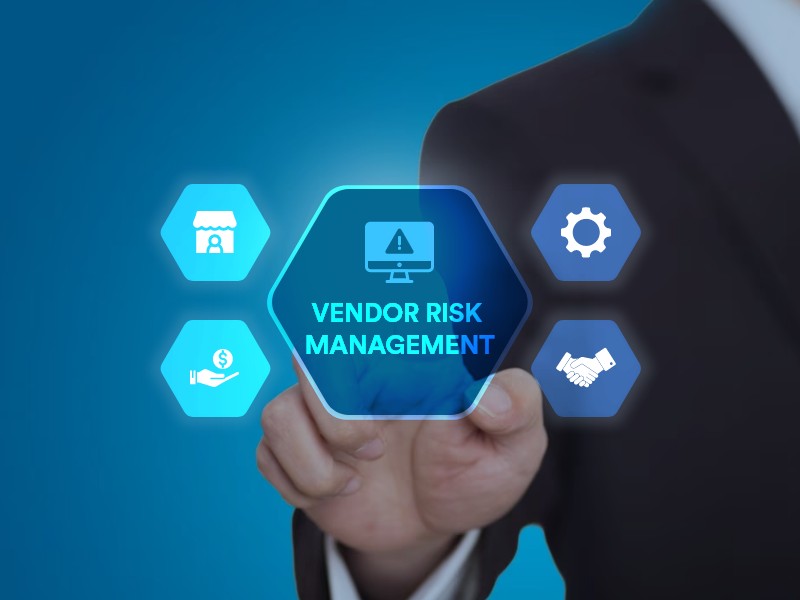Conducting Vendor Reference Checks is Crucial: Know Why?

Does your organization emphasize the importance of vendor reference checks and how to conduct them effectively? Are you aware of the benefits this practice brings to your organization? Whether you’re a seasoned procurement professional or a business owner seeking the right collaborators, you must understand the significance of gathering feedback from other clients. This knowledge will empower you to make informed decisions in vendor selection and pave the way for more robust, fruitful business partnerships.
In today’s dynamic and competitive business environment, selecting the right vendors and partners is crucial for the success of your organization. Vendor reference checksto conduct facility vendor negotiation involve gathering feedback, insights, and opinions from previous and current clients of a potential vendor. This practice offers valuable, real-time information beyond what you will find in a sales pitch or a proposal. It is the key to making an informed decision, mitigating risks and ensuring a successful partnership.
This blog aims to provide detailed insight into vendor reference checks and the benefits they can provide so that you can make the best decisions for your organization.
Why Vendor Reference Checks Are Important for Your Organization?
Vendor reference checks are a crucial step in the vendor selection process and defining the procedure as to how you measure KPI for vendors alongwith several compelling reasons as mentioned below:
Validation of Claims:
Vendors often make enticing claims about their products or services during sales. Reference checks allow you to verify whether these claims align with the vendor’s actual performance. This ensures you’re not making decisions based solely on marketing materials and sales pitches.
Quality Assurance:
By speaking with previous or current clients, you can clearly understand the vendor’s track record in terms of product or service quality, reliability, and consistency. This helps you assess whether the vendor can meet your specific needs and standards.
Risk Mitigation:
Understanding the experiences of other clients can help you identify potential risks and challenges associated with a vendor. Suppose a vendor has a history of missed deadlines, quality issues, or poor customer service. In that case, reference checks can serve as early warning signals, allowing you to assess whether the risks are acceptable or too high.
Insights into Vendor-Customer Relationships:
Reference checks provide insights into the vendor’s relationship with its clients. You can gauge how responsive and adaptable the vendor is to client needs, which is crucial for long-term partnerships. Positive references can indicate a vendor’s commitment to customer satisfaction, and if sustainability is a priority for your organization, it’s also a good opportunity to identify eco friendly vendors who align with your environmental values.
Cost Efficiency:
By conducting reference checks, you can potentially avoid costly mistakes. Choosing the wrong vendor can lead to delays, rework, legal issues, or financial losses. The information gathered through reference checks can help you make a well-informed decision that minimizes these risks.
Benchmarking:
Vendor reference checks allow you to compare potential vendors with one another. You can assess how they stack up against competitors regarding client satisfaction, performance, and value for money. This comparative analysis helps you select the vendor that best aligns with your needs and goals.
Credibility and Trust:
Using references builds trust between you and the vendor. When a vendor is willing to provide references and those references speak positively about their experiences, it instills confidence in the vendor’s capabilities and integrity.
Customized Insights:
Reference checks can be tailored to address specific concerns or requirements you may have. This customization allows you to gather relevant information to your organization’s unique needs and challenges.
Legal and Regulatory Compliance:
Depending on your industry or region, vendor compliance with certain legal or regulatory requirements may be critical. References can illuminate a vendor’s adherence to such conditions, helping you avoid potential legal issues.
Long-term Relationship Building:
Vendor reference checks aid in initial vendor selection and lay the foundation for a productive, long-term partnership. Building relationships with vendors with a proven track record of excellence can lead to strategic alliances that benefit both parties.
How To Conduct Effective Vendor Reference Checks?
Conducting an effective vendor reference checks is a critical step in the vendor selection process. It involves reaching out to previous or current clients of a potential vendor to gather insights and feedback about their experiences. Here’s a detailed guide on how to conduct these checks effectively:
1.Identify Appropriate References:
a. Request a list of references from the vendor. Ensure that these references are relevant to your industry, the specific product or service you’re considering, and the scale of your project.
b. Ideally, you should aim to speak with at least three references to gain a well-rounded perspective.
2.Prepare Questions:
a. Develop a list of questions that cover various aspects of the vendor’s performance. These questions should be open-ended to encourage detailed responses.
b. Common areas to inquire about include the vendor’s product or service quality, reliability, responsiveness, communication, deadline adherence, and any issues or challenges encountered during the engagement.
3.Contact References:
a. Contact the provided references through email or phone, introducing yourself and your organization.
b. Be respectful of their time and schedule interviews at their convenience. Clearly communicate the purpose of the reference check and how their feedback will be used.
4.Conduct Interviews:
a. During the interviews, maintain a professional and impartial tone. Assure the references that their feedback will be kept confidential.
b. Use your prepared questions as a guide, but be open to follow-up questions based on their responses. Encourage them to share specific examples and anecdotes.
c. Pay attention to both positive and negative feedback, as this will give you a well-rounded view of the vendor’s performance.
5.Analyze Feedback:
a. Document the responses from each reference. Look for common themes or patterns in their feedback. This can help you identify strengths and weaknesses.
b. Assess the references’ overall satisfaction with the vendor’s services and whether their experiences align with your organization’s needs and expectations.
6.Verify Key Information:
Verify critical details such as the duration of the engagement, the type of project or services provided, and the size and scope of the client’s organization. This ensures that the references are relevant to your situation.
7.Ask for Recommendations:
Inquire if the references would recommend the vendor and if they would consider working with them again. This can clearly indicate the vendor’s suitability for your needs.
8.Check for Consistency:
Compare the feedback from different references to check for consistency or discrepancies. If multiple connections mention similar strengths or weaknesses, it adds weight to those observations.
9.Assess the Vendor’s Response:
If the vendor is willing to provide references and is transparent about their past engagements, it reflects positively on their credibility. However, consider it a potential red flag if they are hesitant or unwilling to share references.
10.Consider the Entire Picture:
Take the information gathered from reference checks into account along with other factors, such as the vendor’s proposal, pricing, and your own assessments, when making your final decision.
11.Document the Process:
Keep thorough records of your reference check process, including the questions asked, responses received, and any follow-up actions taken. This documentation can be valuable for future reference.
What are the challenges in Vendor Reference Check?
Conducting vendor reference checks can be a valuable part of the vendor selection process, but it also comes with its own set of challenges. Here are some common challenges associated with vendor reference checks:
Limited Pool of References:
Vendors typically list references likely to speak positively about their services. This can limit the objectivity of the feedback obtained during reference checks. It may be challenging to access references who are more critical or have less positive experiences.
Reference Bias:
References may hesitate to provide negative feedback due to concerns about damaging their professional relationships or potential legal implications. This can result in overly positive or vague responses that don’t offer a complete picture of the vendor’s performance.
Time Constraints:
References are often busy professionals, and it can be challenging to coordinate interviews or gather feedback within a tight timeframe. Delays in obtaining reference information can slow down the vendor selection process.
Reliability of Information:
Information obtained from references may not always be accurate or up-to-date. The reference’s perspective may be influenced by their personal biases or experiences, which can affect the reliability of their feedback.
Inconsistent Responses:
Different references may provide varying feedback, making determining a clear consensus about the vendor’s performance difficult. Inconsistent responses can create uncertainty when evaluating the vendor.
Anonymity Concerns:
References may be concerned about their anonymity not being maintained, especially in smaller industries or close-knit professional networks. This fear can lead to reluctance to provide candid feedback.
Limited Depth of Insight:
Some references may not have a comprehensive view of the vendor’s performance, especially if they were not closely involved in the project or engagement. Obtaining detailed and relevant information can be a challenge in such cases.
Data Privacy and Confidentiality:
Sharing specific project details or client information during reference checks can raise concerns about data privacy and confidentiality. Both the vendor and the references may be cautious about disclosing sensitive information.
Legal Considerations:
References may be wary of providing feedback if they are concerned about potential legal repercussions or contractual obligations that prevent them from discussing their experiences with the vendor.
Difficulty in Assessing Cultural Fit:
Reference checks may not completely understand whether the vendor’s culture aligns with your organization’s values and working style. This aspect is crucial for long-term partnerships but can be challenging to assess through references alone.
Vendor Reluctance:
Some vendors may be unwilling to provide references, raising suspicions about their transparency or the quality of their past client relationships.
Despite these challenges, vendor reference checks remain valuable for gathering insights and assessing a vendor’s suitability for your organization. To mitigate these challenges, it’s essential to approach reference checks with a clear strategy, ask open-ended questions, and consider the feedback with other factors in your vendor selection process. Building a network of industry contacts can also help you access more diverse and unbiased references when needed.
Conclusion:
When searching for a supplier, it’s crucial to remember that perfection is not always attainable. Every relationship requires compromise, and selecting a supplier is no exception. Therefore, knowing what you may have to give up is vital when choosing one supplier over another.
In conclusion, facility vendor reference checks are a fundamental aspect of informed decision-making. They offer valuable insights into a potential vendor’s past performance, which helps us confidently navigate the complex vendor selection process. By tapping into the real-world experiences of other clients, you can gain a complete understanding of what to expect from a vendor. This allows us to make better-informed choices, manage risks effectively, and develop long-term partnerships that benefit our organizations significantly.
Ultimately, gathering feedback from other clients is a compass in our search for the right vendor. It aligns our goals with the experiences of those who have gone before us, providing us with the necessary guidance to make informed decisions. This wisdom guides us toward fruitful collaborations, shared success, and a competitive edge in the ever-evolving business world.
For more information on how FieldCircle can streamline your facilities operations with facilities software programs get in touch with our experts today!


